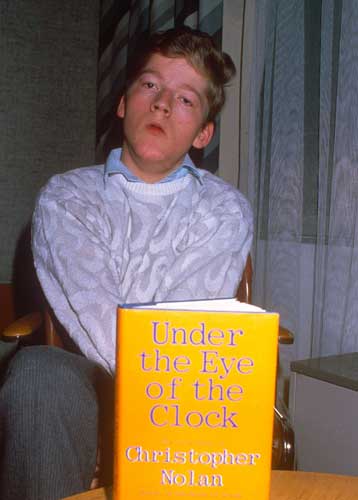Whitbread winner Christopher Nolan dies
Tributes pour in to Irish author who triumphed over disability

Your support helps us to tell the story
From reproductive rights to climate change to Big Tech, The Independent is on the ground when the story is developing. Whether it's investigating the financials of Elon Musk's pro-Trump PAC or producing our latest documentary, 'The A Word', which shines a light on the American women fighting for reproductive rights, we know how important it is to parse out the facts from the messaging.
At such a critical moment in US history, we need reporters on the ground. Your donation allows us to keep sending journalists to speak to both sides of the story.
The Independent is trusted by Americans across the entire political spectrum. And unlike many other quality news outlets, we choose not to lock Americans out of our reporting and analysis with paywalls. We believe quality journalism should be available to everyone, paid for by those who can afford it.
Your support makes all the difference.Christopher Nolan, the Irish writer who despite being almost entirely immobilised by cerebral palsy produced works which brought him awards and international acclaim, has died at the age of 43.
With no real control over the movement of his body, Nolan, 43, could write only by directing a pointer attached to his head at a keyboard, with the aid of his family. Through this painstaking method he produced three books which won him, among other recognition, the Whitbread Prize.
He produced some of his most striking work while in his teens, including a form of autobiography, short stories and poems. News of his death brought tributes to his literary talent and his refusal to be deterred by disability.
When he won the Whitbread Prize, at the age of just 21, he took it as a vindication of years of tortuous exertion. In an acceptance speech which was read by his mother he declared: “I want to shout with joy. My heart is full of gratitude. You all must realise that history is now in the making. Crippled man has taken his place on the world’s literary stage.”
Born in 1965, he suffered from cerebral palsy after experiencing oxygen deprivation during birth. After living for a time in Mullingar, Co Westmeath, the family moved to Dublin. He went to Trinity College, Dublin.
His family said in a statement yesterday: “Despite the severity of his cerebral palsy, Christy’s intellectual abilities were unimpaired and, loving words, he set out to become a writer.
“Following the ingestion of some food into his airways yesterday, oxygen deprivation returned to take the life it had damaged more than 40 years ago.”
His writing attracted early attention. Dam Burst of Dreams, published in 1981 when he was just 15, won much praise, one critic saying he “plummeted into language like an avalanche”. He won the Whitbread in 1988 for the autobiographical Under the Eye of the Clock, in which he unsparingly described his childhood and education and his attempts to come to terms with his “useless body”.
His third major work, The Banyan Tree, detailed the life of Minnie O’Brien, a west of Ireland woman and her family. He was also co-author of a play which was staged in Dublin.
In a tribute, the Irish President, Mary McAleese, said he was a gifted writer whose achievements were all the more remarkable given his daily battle with cerebral palsy. She added: “Christopher’s indomitable courage and determination will be remembered along with his literary gifts, inspiring many generations to come.”
The Arts Minister, Martin Cullen, said: “With grace and courage, and with the support of his family, he never gave up and he never gave in. His bold creativity has ensured a written legacy.”
Join our commenting forum
Join thought-provoking conversations, follow other Independent readers and see their replies
Comments